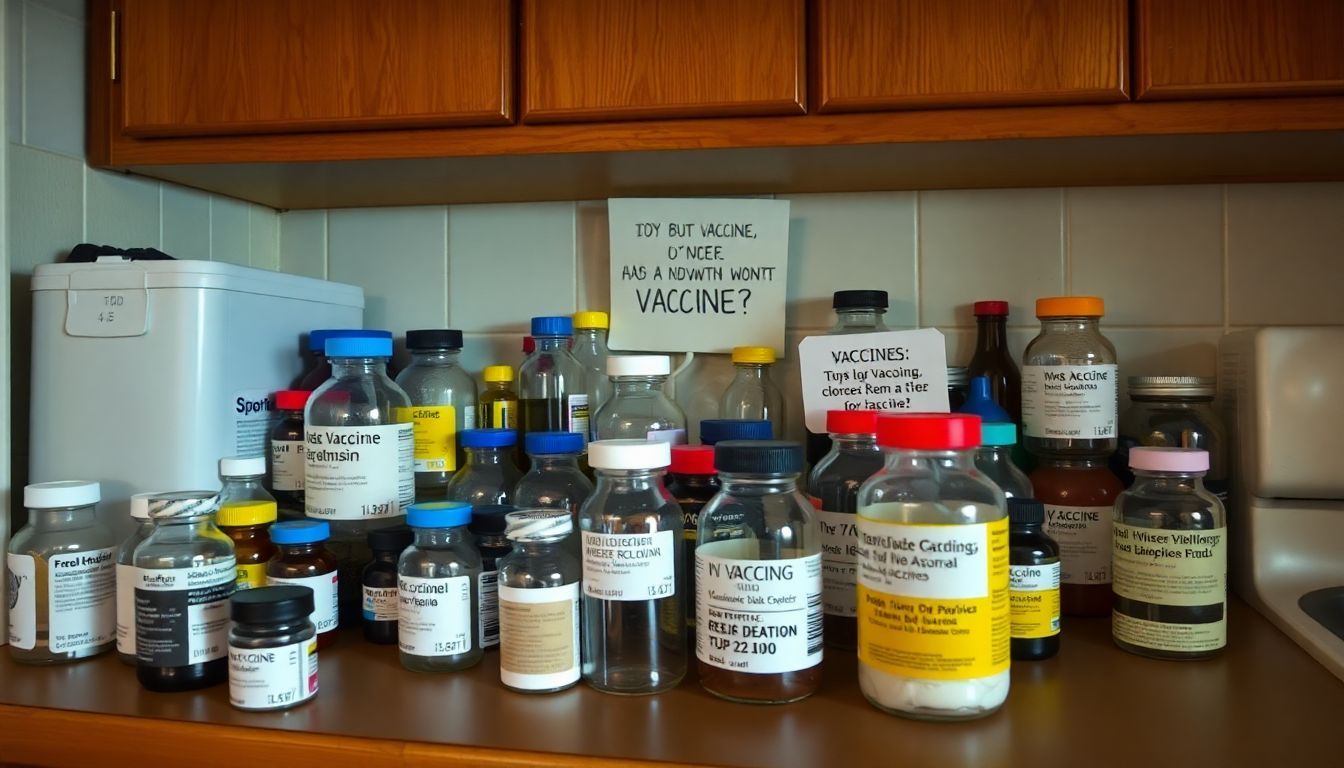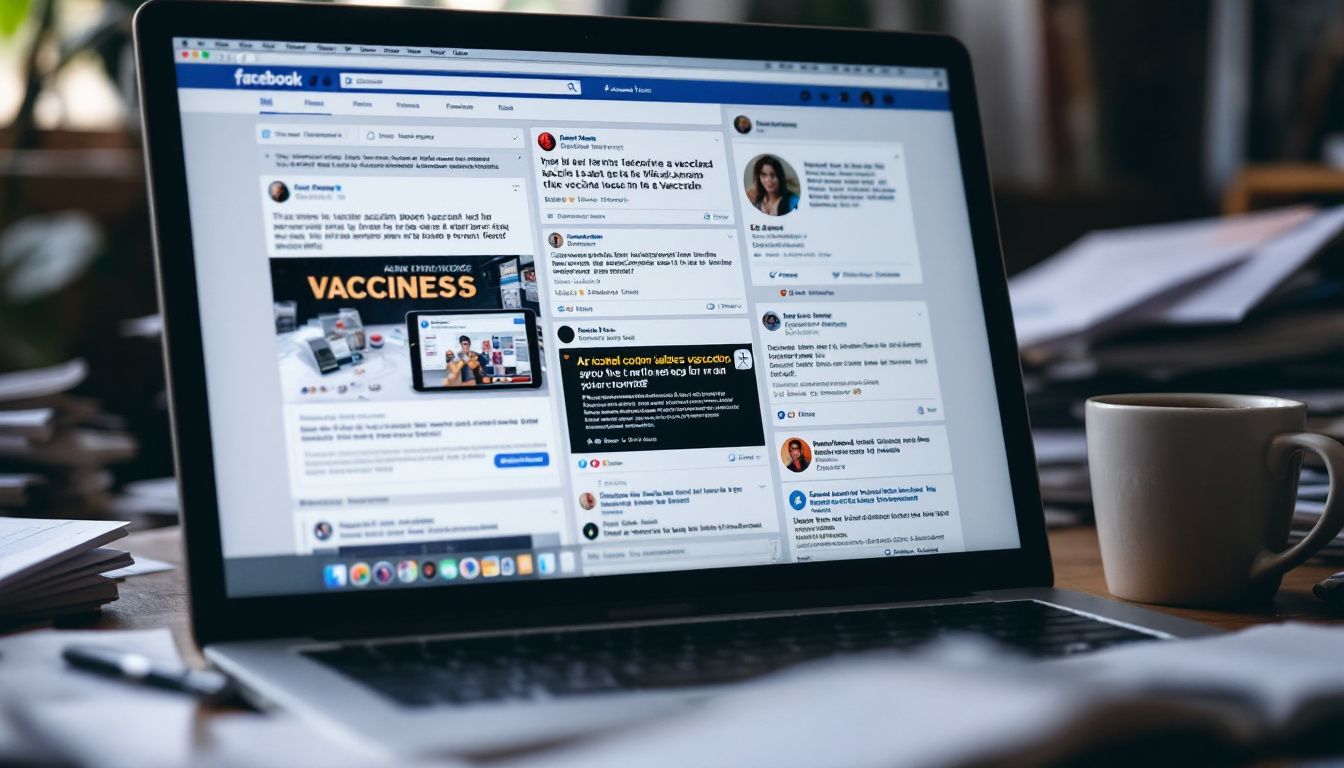Many parents worry about vaccine safety for their children. Social media spreads both helpful facts and harmful misinformation about vaccines. This blog will show how experts can use social media to ease fears, share accurate information, and build trust.
Thank you for reading this post, don't forget to subscribe!Keep reading to learn how it works!
Key Takeaways
- Social media spreads both vaccine facts and misinformation. Experts must use platforms like Facebook, Twitter, and TikTok to share clear, science-backed information to ease parents’ fears.
- Vaccine hesitancy has risen due to false claims about safety and side effects. For example, the MMR-autism link was disproven but still creates fear. Real-world impacts include measles outbreaks in 2019 with over 1,200 cases in the U.S.
- Successful campaigns work with social media companies. Examples include Facebook linking to WHO pages, YouTube banning anti-vaccine content in 2021, and TikTok videos from doctors boosting trust during COVID-19.
- Testimonials from vaccinated families help build confidence. Sharing personal stories shows how vaccines prevent severe illnesses like polio or COVID-19 complications.
- Monitoring discussions on social platforms helps spot trends early. Health experts can track hashtags or vaccine-related posts to address growing concerns quickly with accurate data.
The Growing Hesitation Among Parents
More parents feel unsure about vaccines today. Many worry about safety and trust what they read online.
Misinformation and safety concerns
False information spreads quickly on social media. Parents often see misleading claims about vaccine side effects and effectiveness. This creates fear, making them hesitant to vaccinate their kids.
Anti-vaccination campaigns use bots and fake accounts to amplify these false beliefs. The COVID-19 pandemic highlighted this issue as misinformation about vaccines flooded platforms like Facebook and Twitter.
Safety concerns also play a big role in vaccine hesitancy. Many parents worry about rare side effects or long-term risks, even if clinical trials show vaccines are safe. For example, fears around the MMR vaccine linked it to autism—despite studies disproving this claim again and again.
Clear communication is key to rebuilding public trust in vaccinations for diseases like polio or smallpox.
Outbreaks of preventable diseases
Fear and false claims about vaccine safety have real-world effects. Vaccine hesitancy has caused outbreaks of preventable diseases like measles. In 2019, measles cases in the U.S. hit a record high with over 1,200 infections—the most since 1992.
Such outbreaks can spread fast in communities with low vaccination rates.
The consequences are severe for public health. Once nearly eliminated diseases, such as polio or whooping cough, present serious risks again when vaccination rates drop. Unvaccinated children in particular face life-threatening complications from these illnesses.
Public trust in vaccines plays a key role in reducing these risks and protecting everyone’s health.
Role of Social Media in Addressing Vaccine Concerns
Social media changes the way people learn about vaccines. It can spread facts quickly but also share false information, making careful use important.
Double-edged sword of social media
Social media can spread vaccine education but also fuels vaccine misinformation. Platforms like Facebook and Twitter often amplify anti-vaccine campaigns, misleading information, and echo chambers.
These spread fears about vaccine safety, side effects, and efficacy faster than ever. In 2020 alone, millions of bot accounts were traced promoting anti-vaccination sentiments during the COVID-19 pandemic.
Every post matters—misinformation travels six times faster than truth online.
At the same time, social media offers tools to fight these issues. Health care providers use platforms to share evidence-based facts about vaccines like Infanrix Hexa or the Pfizer-BioNTech vaccine.
Public health campaigns leverage stories from fully vaccinated families to build trust and calm concerns about booster doses or childhood vaccines.
Importance of engaging with parents on social media
Parents use social media platforms like Facebook and Twitter to find health advice. This makes it a key space for addressing vaccine concerns. Healthcare providers must engage directly with parents online to provide accurate, science-backed information.
Without this effort, misinformation about vaccine safety and efficacy can spread quickly.
Clear conversations build trust. Parents feel more confident when experts answer their questions publicly on these platforms. Addressing fears in real time helps combat vaccine hesitancy and improves public confidence.
Engaging ensures the facts reach families before harmful myths do—leading into strategies for tackling misinformation effectively.

Strategies for Addressing Vaccine Concerns on Social Media
Social media can be a powerful tool to ease worries about vaccines. It works best when used to share facts clearly and connect with real-life stories.
Providing clear, evidence-based information
Parents often worry about vaccines. Clear, fact-based details can ease their concerns and build trust.
- Share simple, accurate vaccine facts online. Use easy-to-understand language to explain vaccine safety and effectiveness.
- Address common myths found on social media. Provide examples of misinformation and correct them with trustworthy sources like CDC or WHO.
- Highlight real-life data about vaccine success. Mention reduced disease rates due to vaccines, such as the near-eradication of polio worldwide.
- Include stories from families who vaccinated their kids. These personal accounts help others relate and feel reassured about vaccine benefits.
- Partner with health professionals in campaigns online. Doctors and nurses can give expert advice people respect and follow.
- Post updates on COVID-19 variants like Delta or Alpha regularly to show ongoing research efforts ensuring public safety.
- Promote sharing reliable resources through social media platforms to reach hesitant parents more effectively.
Successful campaigns and collaboration with social media companies
Social media plays a big role in spreading vaccine information. Some campaigns and partnerships have worked well to address vaccine concerns.
- Social media companies teamed up with the World Health Organization (WHO) to fight COVID-19 misinformation in 2020. Facebook added banners linking to WHO and CDC pages, boosting reliable sources.
- Twitter launched a search prompt for “COVID-19 vaccines” to direct users to health authorities’ messages, reducing exposure to anti-vaccine misinformation.
- The “This Is Our Shot” campaign used Instagram and TikTok videos from trusted doctors sharing their vaccine stories. This built public confidence during the pandemic.
- YouTube banned anti-vaccination content in 2021 and partnered with healthcare providers like Mayo Clinic to post clear, fact-checked videos.
- “Vaccinate With Confidence,” led by the CDC, used social media ads targeting rural United States communities hesitant about the Pfizer vaccine’s safety.
- Testimonials from vaccinated families on TikTok, like one showing polio eradication’s success story, helped counter fears tied to side effects.
- Google Trends data helped researchers monitor spikes in “vaccine side effects” searches and update campaigns immediately with proper answers.
- Influencers promoted vaccination on platforms like Snapchat, reaching younger audiences skeptical of SARS-COV-2 vaccines’ efficacy.
- Johnson & Johnson worked closely with Facebook groups focusing on moms unsure about pediatric vaccinations, using personal Q&A sessions via live streams.
- CDC ran Spanish-language campaigns addressing biases within Latino communities online, increasing trust and uptake rates of available COVID-19 vaccines during outbreaks of variants like Delta or Alpha.
Use of testimonials and stories from vaccinated families
Stories from vaccinated families can ease vaccine concerns. Parents may trust real-life examples over plain facts. Hearing how vaccines kept kids safe during outbreaks builds emotional connection and public confidence.
A family might share how vaccination prevented severe COVID-19 effects or reduced other health risks. Such stories highlight vaccine safety, efficacy, and benefits in daily life. Personal experiences spread hope and boost vaccine acceptance among hesitant groups.
Monitoring and Research on Vaccine Communication via Social Media
Monitoring vaccine talks on social media helps spot trends and concerns quickly. Research finds better ways to share clear, trusted facts with the public online.
Ongoing monitoring of vaccine-related discussions
Social media changes fast. Vaccine misinformation spreads quickly on platforms like Facebook, Twitter, and Instagram. Ongoing monitoring helps public health experts spot vaccine hesitancy trends early.
By tracking posts, tweets, and hashtags about vaccines, they can find new rumors or concerns before they grow larger.
Health care providers and researchers use big data tools to analyze these discussions. This allows them to respond with accurate information right away. Quick action builds public trust and boosts vaccine uptake by addressing fears directly.
Further research on effective communication strategies
Tracking social media vaccine discussions highlights gaps in how experts engage with parents. These conversations often show that misinformation spreads faster than facts. More research can improve ways to counter this trend and build public trust.
Health authorities should explore what messages work best for vaccine-hesitant groups. Studies might test tools like video testimonials, simple infographics, or interactive Q&A sessions on platforms such as Facebook or TikTok.
Experts need to also study which tone connects better—empathy, authority, or shared experiences can impact how information is received.
Conclusion
Social media can help ease parents’ worries about vaccines. It spreads both facts and falsehoods, making it key to share clear, truthful updates. Health experts must join online chats to build trust and answer doubts.
Sharing real stories of vaccinated families connects with people emotionally. By staying active online, we can boost vaccine confidence and protect public health.
